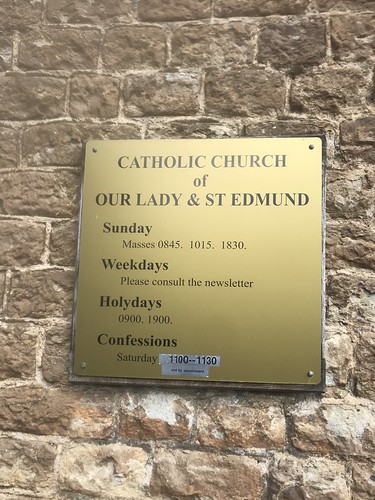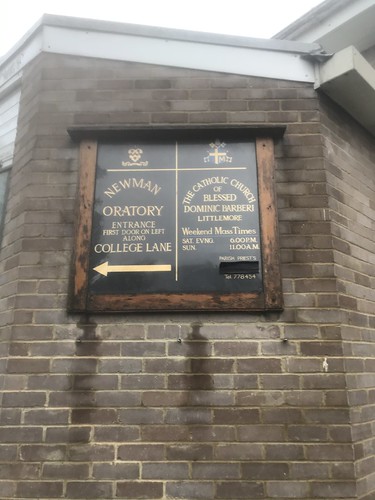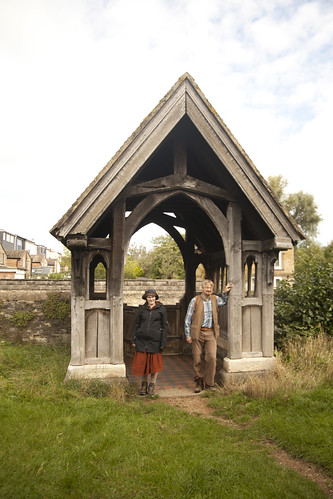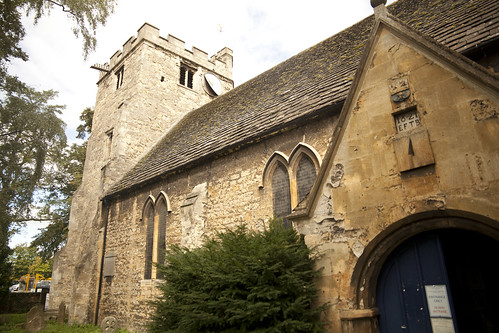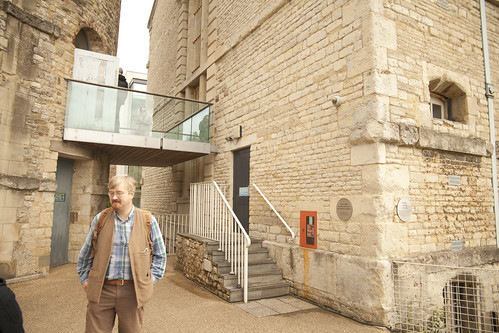Chairman's Blog
Support this Angelico Press project: the Vulnerary of Christ
|
||||||||||||||||||||||||||||||||||||||||||
|
What are the defenders of 'Cuties' really saying?
My latest on LifeSite. A highlight:
I’m not going to review Cuties because I’ve not watched it, and I have no intention of doing so. What I can comment on is the reaction to it, particularly those of people defending it. One might expect defenders of the series to claim that it does not endorse what it depicts — sexualized dancing by underage girls — and they do say this, up to a point. But actually, they do want to endorse it. Here is the New York Times reviewer, Richard Brody:
The subject of “Cuties” isn’t twerking; it’s children, especially poor and nonwhite children, who are deprived of the resources — the education, the emotional support, the open family discussion — to put sexualized media and pop culture into perspective.
What does this story tell us, exactly? Brody patiently explains that in the oppressive, patriarchal society these girls are supposedly part of, despite their complete lack of supervision or effective moral formation, their adoption of sexualized dancing is a way of rebelling and establishing their own identities. So it’s actually good. But it’s also bad, because they are doing it only because they lack resources and education, and are oppressed.
More about Downside
In 1993, a Benedictine monastery, Fort Augustus Abbey in Scotland closed the school that had been its major work since its foundation in 1880, though latterly plagued by allegations of child abuse. In 1998, citing the high cost of maintaining the monastic buildings, the community itself was dissolved, its members dispersing to other monastic communities.
A similar process is now taking place with another Benedictine community, Downside Abbey in England. In 2019, the community was legally separated from the school which had existed alongside the monastic community since 1617, at that time an English Catholic institution in exile on the Continent. School and monastery have shared the current site in southwest England since 1814. But now it has been announced that the monks will be leaving: exactly when and to where has yet to be determined. The monastic buildings were designed for fifty monks, and the community is down to eight, with little prospect of new members. It is expensive to maintain, and co-existing on the same site as a school they no longer run is awkward. It is time, apparently, to move on.
The problems these institutions have had with vocations and with their schools are distinct, though entangled. Britain’s fee-paying boarding schools have had a difficult time in recent years, but many continue to flourish. It seems that they will do so without such a strong contingent of Catholic monastic schools among them as in the past. The more fundamental problem for these and many other communities has been the lack of vocations.
Downside: Open Letter from Fr Christopher Basden
OPEN LETTER OF APPEAL TO DOWNSIDE
On behalf of untold people throughout the world I write to appeal against the monks of Downside surrendering to the current zeitgeist and leaving their monastery. Downside is part of the fabric of English Catholic history. The restoration of the Catholic Church and of monasticism is one of the great victories of Grace after the horrendous rape and interruption by Henry VIII in the 16th Century. We appeal against this decision in the face of a more insidious enemy: that of secularism, relativism and modernism which destroys the Church from within.
Surrendering does not solve the problem. We have faced enemies before and a flight or dispersal to another location(s) is simply the recipe for swift extinction as we have seen previously (Fort Augustus and countless female communities). Have we no faith in the grace of God and the irresistible attraction to the consecrated life and the eternal truth of the Catholic Church?
Let us look at the success stories in the otherwise devastated vineyard of the modern Church. The French Abbey of Fontgombault have made five successful foundations in the last forty years; Randol, Triors, Pyrenees, Clear Creek in Oklahoma (which after twenty-one years is making moves for its own foundation) Wisques. What is the secret of Fontgombault? Simply - traditional Catholicism from observance to worship to belief. This is true also of the Benedictine Communities of Le Barroux (with its foundation near Toulouse), Norcia in Italy, Silverstream near Dublin and countless other smaller communities in the USA.
I can hear the immediate scornful repudiation that this simply going backwards. In so many fields we have to go back to rediscover the genius of our respective traditions from Education to Architecture to Entertainment. We have to have the humility to admit mistakes in seeking renewal and modernity.
Look at the great Empire of American Catholic University Education. With the infamous “Land of Lakes” Agreement of 1967, Catholic universities in the name of renewal and academic freedom surrendered their distinctive Catholic identity to the forces of modernity and secularism. This resulted in a disastrous cessation of vocations and a complete erosion of the ordinary regular transmission of the practice of the Faith from one generation to the next. Fifty years later the great Catholic Universities are Catholic in name only, often benefiting by federal money but no longer bearing fruit for God’s Church. Starting again from scratch there are five Universities (Ave Maria in Florida, Steubenville, Christendom, Thomas More and Thomas Aquinas). What is the result? The transmission of a confident, orthodox faith to the younger generation and the spawning of Catholic marriages and a huge variety of consecrated and ordained vocations.
If you have an allergy to undiluted Catholic tradition, then distil it slightly. Go for orthodoxy and challenging observance. If you are wedded to the Second Vatican Council, then follow its central and novel precept: ‘The Universal Call to Holiness’. Sanctity and schools of The Lord’s Service are simply irresistible! There are so many dioceses and religious groups (Community of St. Martin in France) which are merely conservative and not traditionalist. If we want to conserve the precious treasure of the Catholic Faith and all of its fruits, we simply have to move towards this direction even if not espousing it completely.
It is said that there is no unity in community today. We have to surrender our differing individual preferences to the Science of The Saints to ensure the hermeneutic of continuity and not of dissipation. We have to unite in order to preserve; we have to surrender our own wills to forestall the disintegration of the Institutions of the Catholic Church.
One example from our otherwise devastating English monastic scenario – Parkminster, our only Charterhouse. In 1990 my dear late friend, Dom Bernard O’ Donavon, then Prior, felt they simply could not go on. They were down to eleven old men. The buildings were crumbling all around them. Continual Postulants and Novices simply came and went with none persevering for almost twenty years. The wisdom was that they were finished and that they would have to move. Thankfully, a higher wisdom intervened, Dom Cyril Pierce took over and as a remarkably successful Master of Novices at The Grand Chartreuse (twelve men to solemn profession) also oversaw a confident formation of new men. In addition to this he oversaw lottery funding to repair the sorry state of the monastery. Thirty years later they have twenty-seven monks. It takes but one man with the vision and determination and grace to succeed.
Why do we have to see our Catholic Church in this country despoiled? Why do we have to despair in the face of secularism, so called modernity and the ugly rotten fruits of the sexual revolution which have infected and corrupted our morals and our minds? Many mistakes have been made. Can we not learn for our mistakes and proceed humbly towards a better future?
Fr Christopher Basden, Parish Priest of Ramsgate and Minster, England
More about Obedience
Readers may be surprised, or scandalized, that Catholics like myself critical of bishops who appear to be pushing the practice of Communion in the hand during the COVID-19 epidemic are minimizing the importance of the virtue of obedience. So having criticized one view of what obedience is about, I’d like to say something positive about obedience.
Obedience is indeed a wonderful virtue. We should not see it as a passive or effeminate virtue, but as a primary virtue of the soldier. Christians are, after all, soldiers of Christ, and it is the constant theme of traditional Catholic spirituality that we should overcome our self-will in order to conform ourselves to the will of God. This, after all, is what the love of God is: “If you love Me, obey my commandments” (John 14:15). Furthermore, our religious superiors exercise over us God’s authority, and for most of us our opportunity to obey God in specific matters comes in the form of obeying God in our superiors.
The difficulty modern Catholics have had with obedience is partly the result of spiritual writers of recent centuries taking it too much for granted that they are not talking about obeying our superiors in matters of sin, or about “rash” obedience when what we are commanded might be sin; nor about matters that go beyond our superiors’ competence, or about commands that fail to promote the common good.
Obedience and Holy Communion
 |
| Holy Communion in happier times. LMS Holywell Pilgrimage 2014. |
J.D. Flynn, editor at Catholic News Service, has told his Twitter followers:
Every time I go to Mass it is hard for me to receive in the hand.
Every time I go to Mass, I have to say consciously, “He is the bishop, and you’re not, Flynn.”
That’s been an incredible source of grace. Obedience has been more fruitful for me than any devotion could be.
Mr. Flynn’s argument here is that his reception of Holy Communion in the hand is an exercise of the virtue of obedience, and therefore a source of graces. This is problematic for a number of reasons.
Most obviously, no bishop’s guidelines say that Catholics are obliged to receive at all. Catholics are, in normal times, obliged to receive Holy Communion once a year. Frequent reception of Holy Communion is recommended by the Church for Catholics in a state of grace, but here and now other factors are in play. Some Catholics in this situation have chosen not to receive at all for this period of time. Others have found priests, perhaps on the other side of diocesan boundaries, willing to distribute on the tongue, which of course is perfectly legal.
Read the whole thing.
Downside Abbey to be abandoned: letter of the week
 |
| The mighty Abbey Church at Downside, where Bishop Schneider celebrated the EF for the Latin Mass Society's Priest Training Conference in 2010. |
The news that the Benedictines are to leave Downside Abbey will fill most loyal Catholics with distress and foreboding. The laying low of one of the greatest bastions of English Catholicism leads us to wonder who will follow, for the meltdown is gathering pace.
Interview in The Remnant
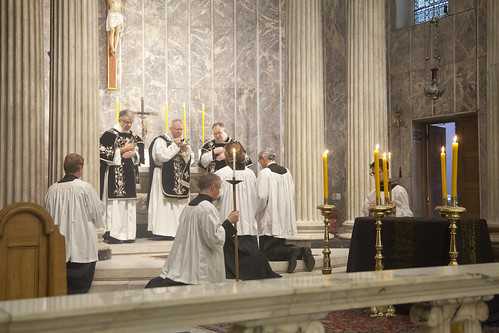 |
| High Mass of Requiem for Colin Mawby, Patron of the Latin Mass Society, in St Mary Moorfield, shortly before the Coronavirus epidemic. |
Q. Isn't the intellectual conception behind this dedication to the Tridentine Mass just another form of "antiquarianism"?
Joseph Shaw: ...The question can be approached from a subjective or an objective perspective. Subjectively, it is legitimate to ask what forms of liturgy and what devotions are most helpful to souls. Some may be of particular benefit to some Catholics, and others to others. Some like the Divine Office, or the Chaplet of the Seven Sorrows of Our Lady, but they are not compulsory, and to say one legitimate devotion or liturgical form is outdated or inappropriate for the current year is ridiculous. If it has been approved the Church, and someone finds it helpful, that is all that needs to be said.
...
In this way Pope Benedict XVI noted in his Letter to Bishops accompanying Summorum Pontificum, “it has clearly been demonstrated that young persons too have discovered this liturgical form, felt its attraction and found in it a form of encounter with the Mystery of the Most Holy Eucharist, particularly suited to them.” This should be a knock-down argument. Who could possibly object to young people deriving graces from one of the Church’s many liturgical forms?...
Nevertheless, there is an objective side to the question as well, and here Catholics attached to the ancient liturgical tradition face ceaseless attacks. ...
What is surprising is to be having these discussions within the Church, and not just with Protestants and non-believers. When Catholic opponents of the Traditional Mass say that ceremonies and prayers used for eight or a dozen centuries throughout the Latin Church are theologically misguided, they are not just criticizing of a small group of cranks found at the fringes of the Church today, but the Catholic Church as a whole. They are saying that the Church got it wrong: that in her most intimate inner life, she offered her children stones instead of bread, not in this or that place, not for some years or decades, but everywhere and for the great majority of her history. It is an argument for what Luther called the “Babylonish captivity of the Church”: that the Church went horribly wrong at a very early date, and needs to be turned upside down to correct it.
...
Assertions such as “the ancient Offertory Prayers are erroneous because they treat the Host as if it had already been consecrated”, or “the silent Canon wrongfully excludes the people from participation in the Mass” cannot be right: they are ultimately incompatible with the Catholic Church being the true Church. They should prompt us to think again about these issues until we can understand the meaning and purpose of these aspects of the Mass correctly. ...
Q. For many apologists of the replacement of Tridentine Liturgy by the new mass, this is the main motivation: the modern man, whose mentality is totally influenced by “science”, can no longer understand complex rituals and sacred symbols. Consequently, the religious language must be completely changed, transformed, replaced by something self-explanatory.
Joseh Shaw: ... The problem then is not the question of change in itself, or the ultimate goal of changes. It is rather this idea that ‘modern man’ can’t understand complex rituals and symbols. We should notice right away that this claim, if accepted, has almost exactly the same results as the Protestant claim that Catholic ritual is idolatrous, and the Enlightenment claim that it is obscurantist, and indeed both these claims find echoes in the writings of Catholic liturgical progressives, though not in magisterial documents. In its practical results, it serves to align the liturgy with the ethos of the intellectual elite which emerged from Protestantism and the Enlightenment.
This is clearly not a coincidence, and it should make us suspicious of it as an empirical claim. The Protestant Reformers and the anti-clerical intellectuals of the Enlightenment did not imagine that the mere passage of time had made or would make people less receptive to ritual. They saw, to their frustration and grief, that people found it very attractive and were deeply formed by it; they found that frequently the only way to counter its appeal was through physical violence.
The same frustration can be seen in the writings of some members of the Liturgical Movement before the Second Vatican Council, and liturgical progressives after it, when they admit that ordinary Catholics had no wish for a liturgical reform, and continued to hanker after the old Mass when it had been taken from them. Even where the changes were accepted more readily, no one could claim that they has answered widespread demands. Even the bishops, whose views were sought in a survey in preparation for the Council, showed very limited interest in a root-and-branch reform of the liturgy (this is documented by Annibale Bugnini himself). Partisans of the reform simply say that the reform was good for the people, and if the peoople did not realize this, this demonstrated their ignorance. ...
Joseph Shaw: The liturgical tradition stretching from Pope Gelasius, and before him, to the Traditional Mass as we have it today, is a plausible candidate for a tradition which conveys to us God’s will about how he wishes to be worshipped. A liturgy put together in a few years by a set of committees orchestrated by Archbishop Bugnini is not a plausible candidate for this role: it would be ludicrous to suggest such a thing.
Clearly those who set up the Consilium and those who accepted its proposals were not thinking in the terms I have just used. They had been trained to think only in terms of Ecclesiastical authority and sacramental validity. This mindset remains widespread among conservative Catholics today. It undermines the idea of the liturgy as an act of worship, as opposed to a dignified and perhaps informative container for the sacraments. It is not surprising for Catholics with this attitude to fail to see the point of a formal act of worship without any sacraments: the public celebration of Vespers, for example, or the celebration of Mass when the Faithful cannot receive Holy Communion (as has happened during the present Coronavirus epidemic). They cannot see what is added to private prayer by the forms given to us by the Church for public prayer.
My weekend pilgrimage
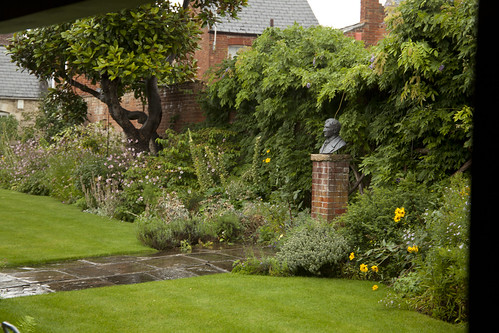 |
| Bust of St John Henry Newman in lay clothes in The College, Littlemore |
And thence to the Oxford Oratory, home of Our Lady of Oxford, our official destination, 5 1/2 miles from our lunch stop.
'Work hard, be nice' is not racist
 |
| Children doing the Stations of the Cross at the St Catherine's Trust Summer School in 2019. |
One of my favorite Twitter accounts is that of Katherine Birbalsingh (@Miss_Snuffy), the Headteacher of an experimental school in a deprived part of London, Michaela Community School. The experiment involves conveying knowledge to the children in an environment in which teachers and pupils do not live in constant fear of being assaulted. Naturally, this is an almost unique experiment, and she is constantly attacked by the progressive teaching establishment. There are precedents for her approach, however, and she expressed her dismay when one of these, the American Charter School chain KIPP, explained that in light of the Black Lives Matter movement that it had decided to change its motto and discipline policy. It explained:
We are retiring “Work hard. Be nice.” as KIPP’s national slogan; it ignores the significant effort required to dismantle systemic racism, places value on being compliant and submissive, supports the illusion of meritocracy, and does not align with our vision of students being free to create the future they want.
The obvious response to this statement is that if children cling to an attitude of angry non-cooperation toward their teachers, they are not going to learn anything or do well in any exams, and if they start off in deprivation, then they will stay there. KIPP, like Miss Birbalsingh’s school, has as its mission lifting children out of poverty and desperation, and if the school is giving up on that, this is a tragedy.









